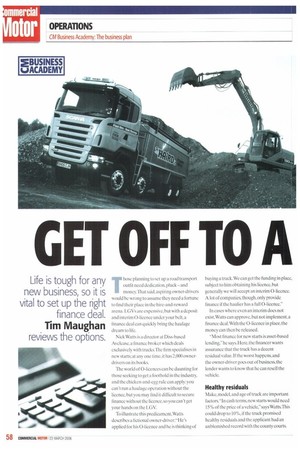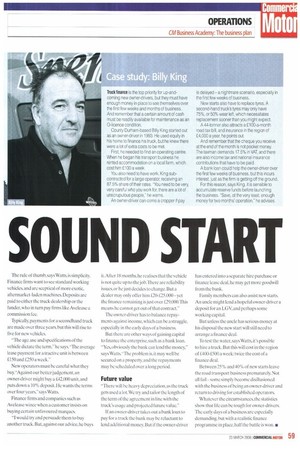GET OFF TO A SOUND START
Page 58

Page 59

If you've noticed an error in this article please click here to report it so we can fix it.
Air hose planning to set up a road transport !! outfit need dedication, pluck — and money.That said, aspiring owner-drivers would be wrong to assume they need a fortune to find their place in the hire-and-reward arena. LGVs are expensive. hut with a deposit and interim 0-licence under your belt, a finance deal can quickly bring the haulage dream to life.
Nick Watts is a director at Diss-based Avelease, a finance broker which deals exclusively with trucks.The firm specialises in new starts; at any one time, it has 2,000 ownerdrivers on its books.
The world of 0-licences can be daunting for those seeking to get a foothold in the industry, and the chicken-and-egg rule can apply: you can't run a haulage operation without the licence, but you may find it difficult to secure finance without the licence, so you can't get your hands on the LGV.
To illustrate this predicament, Watts describes a fictional owner-driver:"He's applied for his 0-licence and he is thinking of buying a truck.We can get the funding in place, subject to him obtaining his licence, but generally we will accept an interim 0-licence. A lot of companies, though, only provide finance if the haulier has a full 0-licence."
In cases where even an interim does not exist,Watts can approve, but not implement, a finance deal. With the 0-licence in place, the money can then be released.
"Most finance for new starts is asset-based lending," he says. Here, the financer wants assurance that the truck has a decent residual value. If the worst happens, and the owner-driver goes out of business, the lender wants to know that he can resell the vehicle.
Healthy residuals
Make, model, and age of truck are important factors. "In cash terms, new starts would need 15% of the price of a vehicle," says Watts.This could drop to 10%, if the truck promised healthy residuals and the applicant had an unblemished record with the county courts. The rule of thumb, says Watts, is simplicity. Finance firms want to see standard working vehicles, and are sceptical of more exotic, aftermarket-laden machines. Deposits are paid to either the truck dealership or the fu nder, who in turn pay firms like Avelease a commission fee.
Typically, payments for a secondhand truck are made over three years, but this will rise to five for new vehicles.
"The age. use and specifications of the vehicle dictate the term," he says."The average lease payment for a tractive unit is between £150 and £250 a week."
New operators must be careful what they buy."Against our better j udgement, an owner-driver might buy a £42,000 unit, and puts down a 10% deposit, He wants the terms over four years," says Watts, Finance firms and companies such as Avelease wince when a customer insists on buying certain unfavoured marques.
"I would try and persuade them to buy another truck. But, against our advice, he buys it. Alter 18 months, he realises that the vehicle is not quite up to the job,There are reliability issues, or he just decides to change. But a dealer may only offer him£20425,000 -yet the finance remaining is just over .£29,000.This means he cannot get out of that contract," The owner-driver has to balance repayments against income, which can be a struggle, especially in the early days of a business.
But there are other ways of gaining capital to finance the enterprise, such as a bank loan. " Yes, obviously the bank can lend the money," says Wails. "The problem is, it may well be secured on a property, and the repayments may be scheduled over a long period.
Future value
"There will be heavy depreciation, as the truck gets used a lot. We try and tailor the length of the term of the agreement in line with the truck's usage and projected future value."
If an owner-driver takes out a bank loan to pay for a truck the bank may be reluctant to lend additional money. But if the owner-driver has entered into a separate hire purchase or finance lease deal, he may get more goodwill from the bank.
Family members can also assist new starts. An uncle might lend a hopeful owner-driver a deposit for an LG V, and perhaps some working capital.
But unless the uncle has serious money at his disposal the new start will still need to arrange a finance deal.
To test the water, says Watts, it's possible to hire a truck. But this will cost in the region of i4004500 a week: twice the cost of a finance deal.
Between 25% and 40% of new starts leave the road transport business prematurely. Not all fail -some simply become disillusioned with the business of being an owner-driver and return to driving for established operators.
Whatever the circumstances, the statistics show that life can he tough for owner-drivers. The early days of a business are especially demanding, but with a realistic finance programme in place, half the battle is won. •




































































































































































































